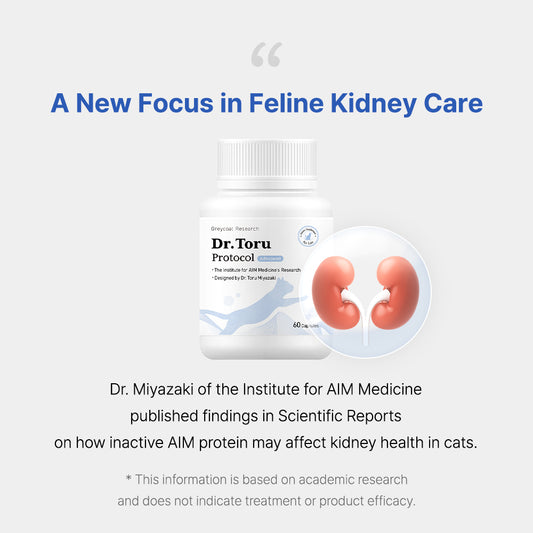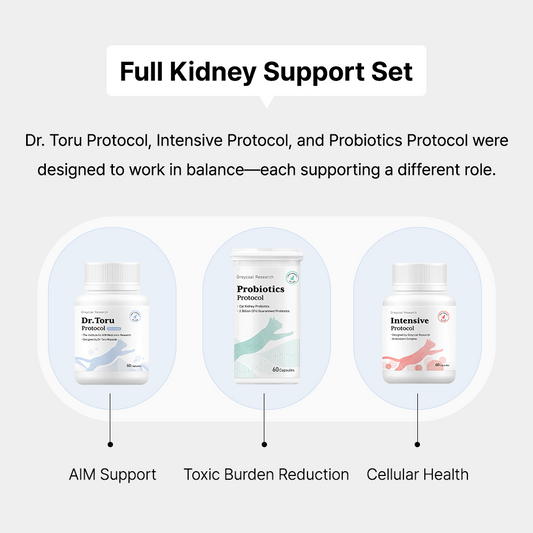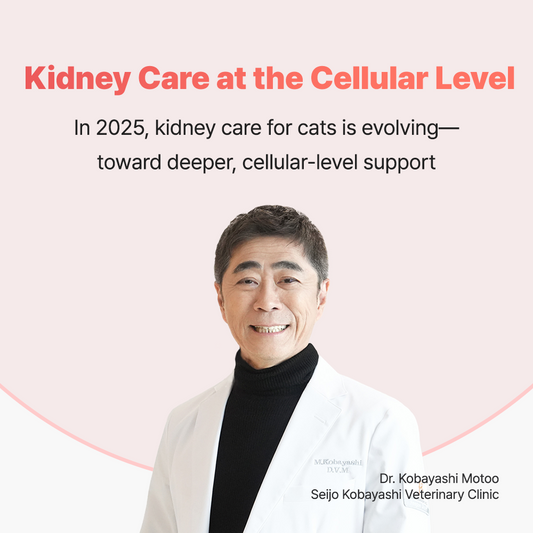Stage 3 Kidney Care Program
It’s not too late — but this is the time to give your best care.
At this stage, issues such as anemia or vomiting may appear,
so begin more focused and proactive care from now on.
At a Glance
This guide provides supplement, diet, hydration, and emergency care tips for Stage 3 kidney care.
1. Supplements
At this stage, nutritional support becomes essential for maintaining stability.
✔ For cats focused primarily on kidney support
- Dr. Toru Protocol – AIM-based Support
Supports the body’s natural waste-clearing system. - Intensive Protocol – Cellular Energy Support
Helps maintain cellular energy and defense against oxidative stress. - Probiotics Protocol – Toxin Burden Support
Supports toxin balance and gut flora stability. - Omega-3 – Circulatory Support
Helps maintain circulatory wellness and organ balance.
✔ For cats needing both kidney and heart support
Some cats at this stage may require additional support for heart health.
In addition to the above supplements, consider adding:
- Greycoat Calm – Cellular Stability Support
Helps maintain cellular stability, supporting heart, kidney and red blood cell wellness.
2. Diet & Feeding
At this stage, a fully renal-friendly diet is essential to reduce strain on the kidneys.
✔ Feeding Tips
- Offer renal formulas with controlled protein, sodium, and phosphorus.
- Avoid treats except when giving medication or supplements.
- If your cat refuses to eat, you may need to provide assisted feeding.
- Eating enough is more important than avoiding stress.
- Use appetite aids only under veterinary guidance.
3. Hydration & Fluids
At this stage, subcutaneous fluids become very important for comfort and stability.
✔ Hydration Tips
- Aim for about 40–50 ml/kg per day (oral + Sub-Q combined).
- Common fluids include Hartmann’s Solution, Normal Saline (0.9%), or Plasma-Lyte.
- The amount and type of fluid may vary depending on heart, lung, and electrolyte status.
- Always follow your veterinarian’s guidance when providing fluids.
- If fluid or electrolyte management is not discussed, consider seeking a second opinion.
4. Routine Checkpoints
Consistent observation helps guide appropriate care.
✔ Every 2–4 Weeks
- Blood tests: Creatinine, BUN, Phosphorus, Electrolytes, and Bicarbonate.
- Red blood cell count (HCT/RBC) to monitor anemia trends.
- Cats in Stage 3 may develop electrolyte imbalance, anemia, or metabolic acidosis.
✔ Every 3 Months
- Check blood pressure, cardiac biomarkers (e.g., proBNP), and chest condition.
- Stage 3 cats may also develop heart or lung-related complications.
✔ Every Day
- Weigh your cat under the same conditions for accuracy.
- Track appetite and activity — sudden changes may indicate imbalance.
- Vomiting — may be related to uremia or anemia and should be checked by a veterinarian.
5. Emergency Signs
Seek veterinary attention if you notice:
- Complete loss of appetite or frequent vomiting
- Noticeable lethargy or unsteady movement
- Labored or open-mouth breathing
- No bowel movement for over 48 hours
- Persistent straining to urinate or defecate
6. When to Seek a Second Opinion
Consider consulting another clinic if:
- Subcutaneous fluids are not offered even when your cat needs them.
- Electrolyte or acid–base management is not discussed.
- You are told “nothing more can be done” without further review.
Reference
According to the IRIS Guidelines, Stage 3 represents a significant decline in kidney function.
At this stage, kidney function is usually around 15–33% of normal.
Creatinine levels typically range from 2.9 to 5.0 mg/dL, and BUN is usually between 31 and 75 mg/dL.
Values may vary depending on individual health status and laboratory standards.
Disclaimer
This content is provided for educational reference only and is not intended to replace veterinary diagnosis or treatment.
Always consult your veterinarian for professional guidance, and use Greycoat products as part of a supervised care routine.
猫のための完璧なケアルーティン
Stories From Cat Guardians
Our mission is to advance feline kidney health
— Greycoat Research






















